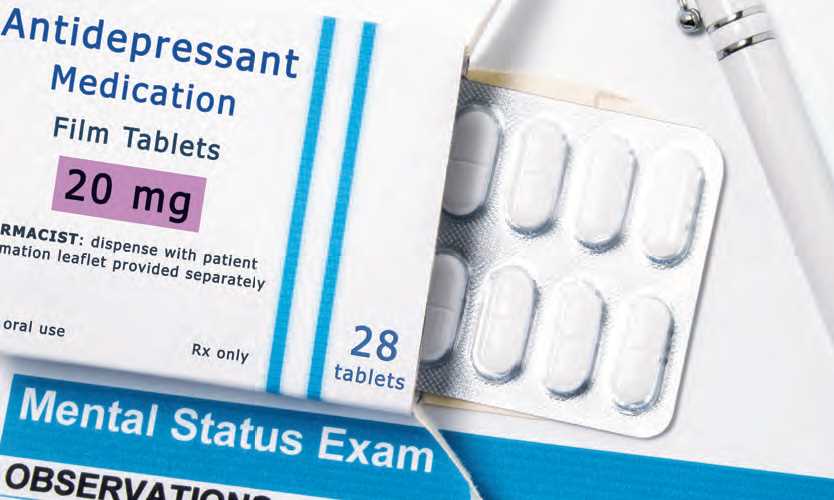Antidepressants may stretch recovery, costs
- April 14, 2025
- Posted by: Web workers
- Category: Workers Comp

Drugs intended to help injured workers manage depression and other mental health conditions while recovering could be prolonging and increasing the cost of workers compensation claims.
The prescribing of antidepressants to injured workers should be better monitored, experts say.
At least one insurer is starting to apply a key tactic used to address excessive opioid prescribing to antidepressant claims, and others say they are monitoring claimants on antidepressants more closely by involving nurse-case managers and other claims handlers trained in spotting problems early.
“We spend a lot of time on opioids but we don’t pay a lot of attention to antidepressants,” said Dr. Dan Hunt, medical director of Lansing, Michigan-based comp insurer AF Group, which partnered with researchers at Johns Hopkins University School of Medicine in Baltimore to analyze the drug patterns of 22,383 indemnity comp claims that were more than 3 years old from 2008-2013.
The findings, published in the Journal of Occupational and Environmental Medicine in April, surprised him because they found that the presence of medicine meant to help an injured worker mentally cope in an injury, with the income adjustment that comes with being out of work and other factors that affect well-being, could be partially responsible for prolonging the claim.
Specifically, the results showed that claims with both opioid and antidepressant prescriptions closed at a rate of 64.8% while claims with only opioid prescriptions closed at a rate of 89.1%.
Claims with antidepressants also cost more: $64,507 on average for claims with both antidepressants and opioids compared with $28,563 for claims with only opioids, according to the study.
Even when controlling for age, chronic pain, medical complexity and claim development, antidepressant claims were more likely to remain open at the end of the fiveyear study period, according to the study.
The study’s takeaway is that antidepressants can have an effect on claims, and AF Group is going to add the group of medications to its pharmacy alerts that trigger a claims handler or nurse case manager to look into a claim, Dr. Hunt said.
Such alerts are common for opioids among insurers and pharmacy benefits managers grappling with regulations and formularies that limit opioids and in-house policies that call for better oversight of pain medications and have contributed to a decline in opioid prescribing, according to numerous reports.
But the focus on antidepressants is new, experts say.
“We are not saying antidepressants are bad, but it’s an indicator that this claim may need more attention,” said Dr. Hunt.
That antidepressants are so common in comp is helping to sound alarms, according to experts.
Antidepressants were among the top five drugs prescribed to injured workers, after pain medications, according to a report by the California Workers’ Compensation Research Institute in February 2019. The study also found that antidepressant prescriptions grew 53.8% from 2009 to 2018 — faster than pain-relieving anti-inflammatories, which saw a 48.1% increase.
MyMatrixx, a Jacksonville, Florida-based pharmacy benefits manager and subsidiary of Express Scripts Holding Co., also saw that antidepressants were among the top five drugs prescribed to comp patients, according to a drug trends report released in April.
The Optum Workers’ Comp and Auto No-fault Solutions report revealed the same ranking in April — adding that antidepressants accounted for 7.5% of the drug spend in 2018, a slight increase over the 7.4% in 2017. By comparison, opioids — in the top slot — accounted for 26.6% of the drug spend, according to that report.
Julie Black, Tucson, Arizona-based vice president of First Script Clinical Services at Coventry Workers’ Comp, said antidepressants are in the top 10 for drug spend for injured workers for Coventry clients.
Antidepressants are a sign that “something else” is going on with the claim, she said.
“We see (antidepressants) more often than not in long-term claims,” Ms. Black said. “It’s a concern.” While most antidepressants are taken to help stabilize moods by reacting with brain chemicals, some are known to help with pain management. Cymbalta is one brand medication known to be prescribed for pain, and its emergence as a nonopioid alternative is fueling its popularity, Ms. Black said.
But most antidepressants are taken to treat depression and are typically coupled with other pain therapies, including opioids, she said.
“They want to get back to work, but they can’t because they are hurt and in pain,” she said.
This raises questions about what effect prescribed antidepressants have on a claim, she said.
“It’s a gray area … it’s kind of the chicken or the egg: Which came first? Is the antidepressant prolonging the claim or is it just a long claim with chronic pain?” she said.
“To us, antidepressants signal that the injured worker is experiencing a mental health issue — that it could be related to the injury or it could be a preexisting condition,” said Dr. Robert Hall, Westerville, Ohio-based corporate medical director for Optum. “This is something that we are paying attention to … (Because) mental health illnesses and disorders generally do not resolve in the time frame that you would see a non-mental health injury.”
Recent attention to antidepressants is a further sign that the industry needs to focus more on the whole health of the injured employee, said Silvia Sacalis, a Tampa, Florida-based licensed pharmacist and vice president of clinical services for Healthesystems LLC.
“A lot of injured workers do require appropriate antidepressant treatment in light of their new reality” as a worker who is grappling with an injury, she said. “It’s a new reality for them, and some of them have trouble adjusting. They are human.”



